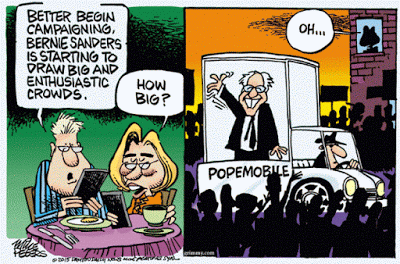There has been for quite a while now discussions on why younger voters prefer Bernie over Hillary in the Democratic contest (see this WAPO piece from last year, or this in the NYTimes, or this more recent by Nate Silver). Maybe someone already noted this before and I missed it, but it seems that the obvious answer is related to Bernie's proposals on health (Medicare for all) and education (tuition and debt free college). The other issues do not have an evident difference in their effects on young versus older voters. One would think that all democrats and left-leaning independents think that corporations have too much power and that inequality is beyond reasonable levels (the one issue in the campaign, arguably).In the case of health, the US is unique among developed countries to have created a separate health insurance for the elderly. The reasons for that are complex and can only be understood in historical context. In the 1930s, unemployment was the priority and providing and income for the elderly was the main goal, leading to the creation of Social Security, which was seen as having more chances of being approved in Congress than other social reforms. When Truman tried to enact a health care system for all, Southern conservatives, which were part of the Democratic coalition, backed off from it, since it would imply integration of hospitals.
Topics:
Matias Vernengo considers the following as important: bernie sanders, Education, Health Insurance
This could be interesting, too:
Joel Eissenberg writes The Trump/Vance Administration seeks academic mediocrity
Bill Haskell writes Study Shows Workers Fleeing States With Abortion Bans
Angry Bear writes The Impact of Debt Interest Payments
Angry Bear writes Rust Belt Cities reborn?
There has been for quite a while now discussions on why younger voters prefer Bernie over Hillary in the Democratic contest (see this WAPO piece from last year, or this in the NYTimes, or this more recent by Nate Silver). Maybe someone already noted this before and I missed it, but it seems that the obvious answer is related to Bernie's proposals on health (Medicare for all) and education (tuition and debt free college). The other issues do not have an evident difference in their effects on young versus older voters. One would think that all democrats and left-leaning independents think that corporations have too much power and that inequality is beyond reasonable levels (the one issue in the campaign, arguably).
In the case of health, the US is unique among developed countries to have created a separate health insurance for the elderly. The reasons for that are complex and can only be understood in historical context. In the 1930s, unemployment was the priority and providing and income for the elderly was the main goal, leading to the creation of Social Security, which was seen as having more chances of being approved in Congress than other social reforms. When Truman tried to enact a health care system for all, Southern conservatives, which were part of the Democratic coalition, backed off from it, since it would imply integration of hospitals. As a result, in the US Medicare was developed as part of a plan to extend minimum hospital insurance for the elderly, and was seen as an extension of Social Security.*
The downside of this American peculiarity (yes, in this case exceptionalism is right) is that Medicare created a constituency for the program. There is a fear, sometimes exacerbated by the 'liberal' advisors of Hillary, that universal health care would imply worsening treatment, or more expensive at least, for the elderly. In the case of free access to college education the age divide is even more obvious. It is still unclear that Hillary will be the Democratic candidate, and certainly there is a chance for Bernie, but if he is to win it will depend to a great degree on younger voters, and that is related to his health and education proposals.
* Medicaid was an extension of welfare, and as such had a lower status, since recipients were (and are) seen as less deserving.

